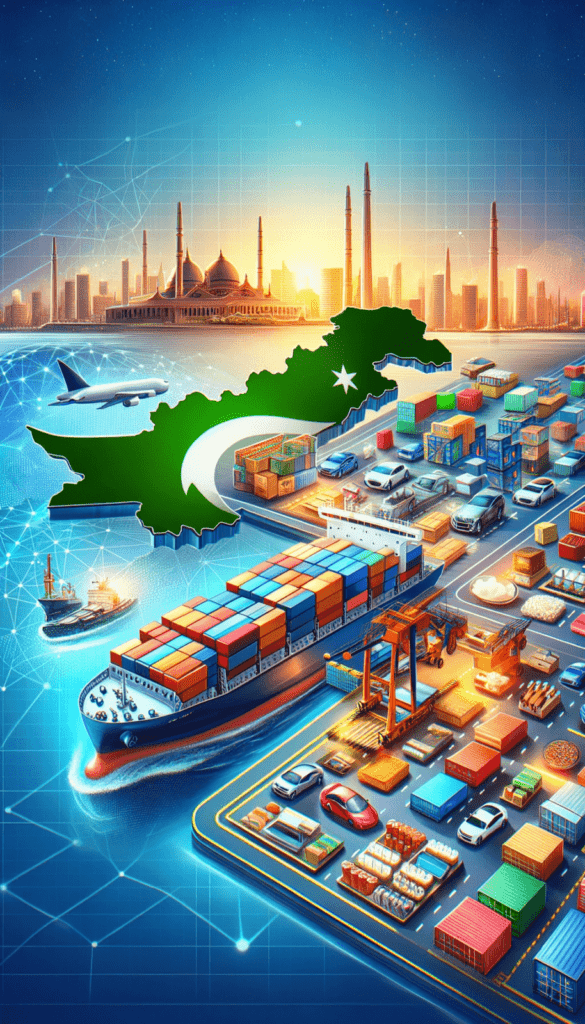Guide on How to Import Products into Pakistan
Importing into Pakistan: An Overview
Pakistan, with its strategic location and growing market, presents lucrative opportunities for businesses and individuals looking to import a variety of products. Understanding the complexities of the import process, however, is crucial for successful and legal entry into the Pakistani market.
This guide aims to provide a comprehensive overview of the procedures, legal requirements, and considerations for importing goods into Pakistan, covering a wide range of products from everyday consumer items to specialized equipment. Whether you are a seasoned business owner or a new entrant in the import sector, this guide will serve as a valuable resource, helping you navigate the legal and logistical landscape of importing into Pakistan.
Extensive Range of Importable Goods
Pakistan’s diverse market accommodates a wide array of products, catering to various sectors and consumer needs. The scope of importable goods is extensive, encompassing:
- Electronics and Mobile Devices: Including smartphones, laptops, and other consumer electronics.
- Automobiles and Vehicle Parts: Ranging from cars to motorcycles and their respective parts.
- Luxury Items: Such as designer clothing, high-end electronics, and luxury watches.
- Food Items: Including both perishable and non-perishable food products.
- Pharmaceuticals: Medications, medical equipment, and health-related products.
- Chemicals: Used in industrial, agricultural, or consumer products.
- Agricultural Products: Seeds, machinery, and other farming-related items.
Each category of products comes with its own set of regulatory requirements and challenges. Understanding these nuances is key to a smooth import process. The subsequent sections of this guide will delve into the specific legal parameters and requirements, ensuring you are well-equipped to import these products into Pakistan.
Regulatory Framework for Understanding Pakistan’s Legal Landscape for Imports
Navigating the legal landscape for imports in Pakistan requires awareness of both national laws and international regulations. Key Pakistani laws and regulations governing imports include (but are not limited to):
- Import and Export (Control) Act, 1950: The foundational legal framework for regulating imports and exports in Pakistan.
- Customs Act, 1969: Outlines the customs procedures, duties, and penalties related to importation.
- Sales Tax Act, 1990: Details the application of sales tax on imported goods.
- Foreign Exchange Regulation Act, 1947: Governs foreign currency transactions and exchange controls impacting imports.
- Trade Organizations Act, 2013: Regulates trade organizations and chambers of commerce involved in import activities.
Additionally, international regulatory bodies and legislations impacting imports into Pakistan include:
- World Trade Organization (WTO) regulations and agreements.
- Basel Convention: Governing the transboundary movement of hazardous wastes and their disposal.
- CITES (Convention on International Trade in Endangered Species of Wild Fauna and Flora): For importing products derived from wildlife.
Importing products into Pakistan as an Individual
For individuals looking to import goods into Pakistan, it is essential to understand the distinct regulations that apply. Personal imports often have different duty structures and may require specific clearances, especially for high-value items like electronics or luxury goods. Individuals must adhere to the allowed limits and declarations as stipulated by the Customs Act, 1969.
It’s also important to be aware of any restricted or prohibited items under Pakistani law. For personal imports, compliance with quality and safety standards, particularly for consumables and pharmaceuticals, remains a key consideration.
Legal Requirements for Business Imports into Pakistan
Businesses importing goods into Pakistan must first ensure they are duly registered and compliant with the local business and tax laws. This involves obtaining a National Tax Number (NTN) and registering with the Federal Board of Revenue (FBR). For businesses, adhering to the Import and Export (Control) Act, 1950, and obtaining the necessary import licenses is crucial.
This is especially pertinent for specific categories of goods like pharmaceuticals, chemicals, and certain technology products. Additionally, businesses should be aware of and comply with international trade agreements and customs regulations, which can significantly impact import duties and processes. Proper record-keeping and adherence to customs and tax regulations are essential to avoid any legal complications. Being a registered business in Pakistan also opens opportunities to benefit from various trade agreements and tax exemptions that Pakistan has in place.
Key Legal Considerations for Importing into Pakistan
Businesses and individuals looking to import goods into Pakistan must adhere to a comprehensive set of legal requirements. These include:
- Obtaining Necessary Licenses and Permits: Depending on the nature of the goods, specific licenses and permits may be required from relevant authorities.
- Customs Compliance: Adherence to the Customs Act, 1969, including payment of applicable duties and taxes, and compliance with customs valuation and classification.
- Quality and Safety Standards: Compliance with Pakistan Standards and Quality Control Authority (PSQCA) guidelines for certain products.
- Food and Drug Regulations: For pharmaceuticals and food items, adherence to regulations set by the Drug Regulatory Authority of Pakistan (DRAP) and the Pakistan Food Authority.
- Environmental and Health Regulations: Ensuring compliance with environmental and health safety standards, especially for chemicals and hazardous materials.
- Intellectual Property Rights: Respecting IPR, particularly when importing branded or patented goods.
- Anti-Dumping and Countervailing Measures: Awareness of any anti-dumping duties imposed on certain imports to protect domestic industries.
International Trade Agreements – Impact on Pakistan’s Import Processes
Pakistan’s import procedures are also influenced by various international trade agreements. These agreements can affect tariffs, trade barriers, and customs procedures. Key agreements include:
- South Asian Free Trade Area (SAFTA): Enhancing trade liberalization among South Asian countries, affecting tariffs and trade for specific goods.
- China-Pakistan Free Trade Agreement: Providing preferential treatment and tariff reductions for certain goods imported from China.
- Pakistan-European Union Trade Cooperation: Offering tariff concessions under the Generalized System of Preferences (GSP) scheme, particularly benefiting textiles and garments imports.
- Economic Cooperation Organization (ECO) Trade Agreement: Facilitating trade among member countries through reduced tariffs and simplified customs procedures.
- Preferential Trade Agreements (PTAs) with countries like Malaysia, Indonesia, and Turkey, influence tariff structures for various imported goods.
Alongside the previously mentioned agreements, Pakistan’s import dynamics are significantly shaped by trade agreements with the United Arab Emirates (UAE), including Dubai. These agreements play a crucial role in shaping trade policies and procedures:
- Pakistan-UAE Free Trade Agreement: This agreement facilitates a range of trade activities between Pakistan and the UAE. It aims to reduce tariffs and remove trade barriers on various goods, enhancing bilateral trade relations.
- Dubai as a Trade Hub: Dubai, a prominent emirate within the UAE, serves as a significant trade hub for Pakistani imports. The strategic location of Dubai and its free zones offer advantageous trade conditions, especially for re-export activities.
- Investment Opportunities and Economic Zones: The UAE-Pakistan economic partnership extends beyond trade to include investment opportunities. Special economic zones and business-friendly policies in Dubai and other emirates provide fertile ground for Pakistani businesses to grow.
Understanding the nuances of these agreements and the unique position of Dubai as a trade hub is vital for Pakistani importers. It allows them to leverage strategic advantages in terms of costs, logistics, and market access.
Connect with 24Justice for Expert Guidance
Embarking on the import journey in Pakistan can be complex, but with the right knowledge and support, it becomes a manageable and profitable endeavor. Whether you are dealing with the intricacies of legal requirements, navigating through customs procedures, or looking to maximize benefits under international trade agreements, 24Justice is here to assist.
Our team of Corporate Lawyers in Pakistan and International experts provides personalized advice, ensuring your import activities are compliant with Pakistani law and international standards. We offer guidance on obtaining necessary licenses, understanding customs duties, and making the most of trade agreements.
Need Personalized Legal Assistance?
You can use our AI Legal Site in Pakistan for general information (24Justice.com). Our team of expert lawyers in Pakistan is just a call or a message away. Reach out to us for specialized guidance on importing goods to Pakistan:
Call: 0092 308 5510031
WhatsApp: 0092 308 5510031
Prefer writing to us? Simply fill out the contact form below and we’ll get back to you promptly. At 24Justice, we’re committed to empowering you with the legal expertise you need.
[wpforms id=”4658″]



